时态的特殊用法
- 格式:doc
- 大小:46.00 KB
- 文档页数:5
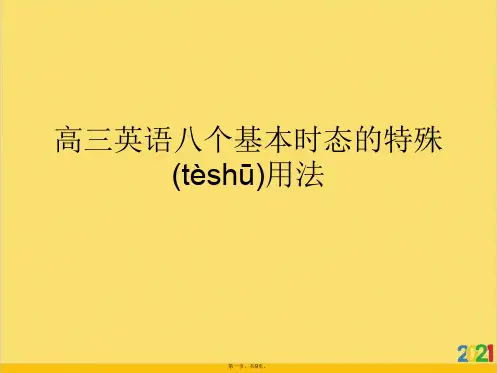
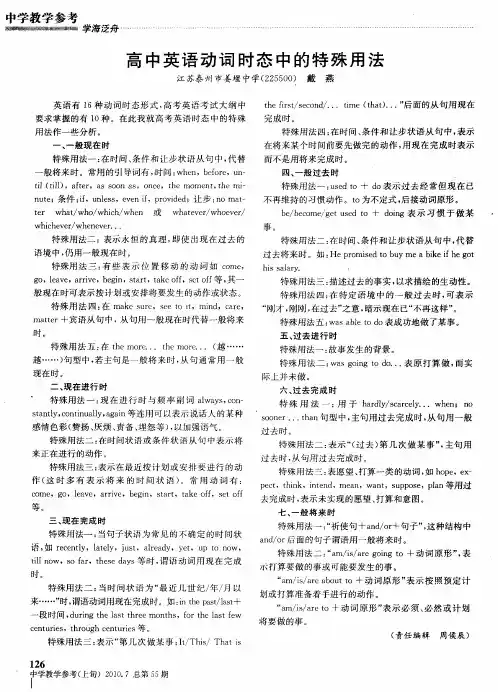
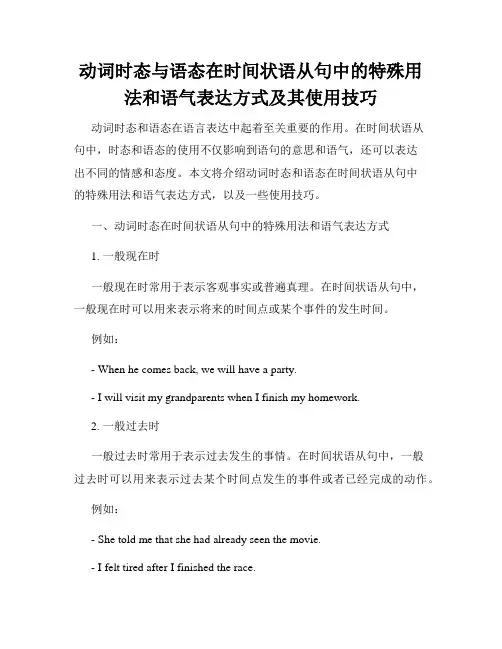
动词时态与语态在时间状语从句中的特殊用法和语气表达方式及其使用技巧动词时态和语态在语言表达中起着至关重要的作用。
在时间状语从句中,时态和语态的使用不仅影响到语句的意思和语气,还可以表达出不同的情感和态度。
本文将介绍动词时态和语态在时间状语从句中的特殊用法和语气表达方式,以及一些使用技巧。
一、动词时态在时间状语从句中的特殊用法和语气表达方式1. 一般现在时一般现在时常用于表示客观事实或普遍真理。
在时间状语从句中,一般现在时可以用来表示将来的时间点或某个事件的发生时间。
例如:- When he comes back, we will have a party.- I will visit my grandparents when I finish my homework.2. 一般过去时一般过去时常用于表示过去发生的事情。
在时间状语从句中,一般过去时可以用来表示过去某个时间点发生的事件或者已经完成的动作。
例如:- She told me that she had already seen the movie.- I felt tired after I finished the race.3. 一般将来时一般将来时常用于表示将来发生的动作或者存在的状态。
在时间状语从句中,一般将来时可以用来表示主句之后发生的动作。
例如:- I will call you when I arrive at the airport.- Don't forget to bring an umbrella if it rains tomorrow.4. 现在进行时现在进行时常用于表示现阶段正在进行的动作。
在时间状语从句中,现在进行时可以用来表示将来某个时间点正在进行的动作。
例如:- He will be sleeping when you get home.- They will be waiting for the bus when it arrives.5. 过去进行时过去进行时常用于表示过去某个时间点正在进行的动作。
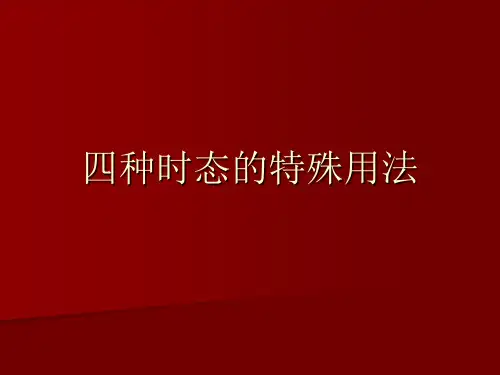
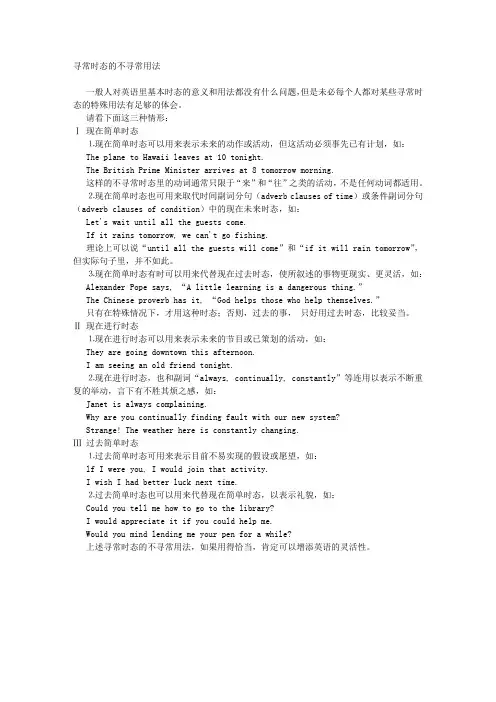
寻常时态的不寻常用法一般人对英语里基本时态的意义和用法都没有什么问题,但是未必每个人都对某些寻常时态的特殊用法有足够的体会。
请看下面这三种情形:Ⅰ现在简单时态⒈现在简单时态可以用来表示未来的动作或活动,但这活动必须事先已有计划,如:The plane to Hawaii leaves at 10 tonight.The British Prime Minister arrives at 8 tomorrow morning.这样的不寻常时态里的动词通常只限于“来”和“往”之类的活动,不是任何动词都适用。
⒉现在简单时态也可用来取代时间副词分句(adverb clauses of time)或条件副词分句(adverb clauses of condition)中的现在未来时态,如:Let's wait until all the guests come.If it rains tomorrow, we can't go fishing.理论上可以说“until all the guests will come”和“if it will rain tomorrow”,但实际句子里,并不如此。
⒊现在简单时态有时可以用来代替现在过去时态,使所叙述的事物更现实、更灵活,如: Alexander Pope says, “A little learning is a dangerous thing.”The Chinese proverb has it, “God helps those who help themselves.”只有在特殊情况下,才用这种时态;否则,过去的事,只好用过去时态,比较妥当。
Ⅱ现在进行时态⒈现在进行时态可以用来表示未来的节目或已策划的活动,如:They are going downtown this afternoon.I am seeing an old friend tonight.⒉现在进行时态,也和副词“always, continually, constantly”等连用以表示不断重复的举动,言下有不胜其烦之感,如:Janet is always complaining.Why are you continually finding fault with our new system?Strange! The weather here is constantly changing.Ⅲ过去简单时态⒈过去简单时态可用来表示目前不易实现的假设或愿望,如:lf I were you, I would join that activity.I wish I had better luck next time.⒉过去简单时态也可以用来代替现在简单时态,以表示礼貌,如:Could you tell me how to go to the library?I would appreciate it if you could help me.Would you mind lending me your pen for a while?上述寻常时态的不寻常用法,如果用得恰当,肯定可以增添英语的灵活性。
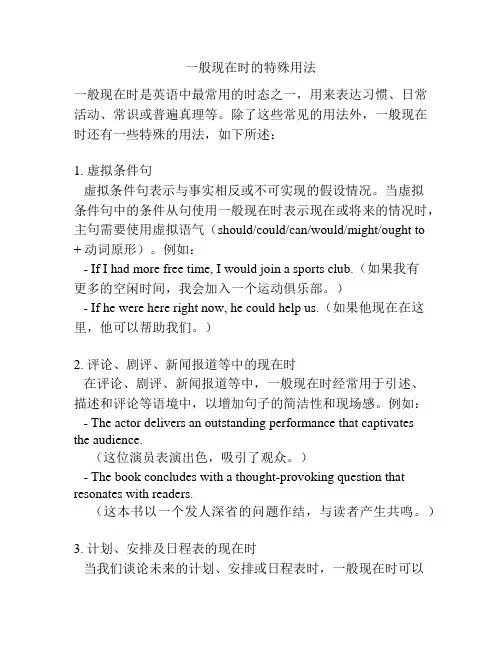
一般现在时的特殊用法一般现在时是英语中最常用的时态之一,用来表达习惯、日常活动、常识或普遍真理等。
除了这些常见的用法外,一般现在时还有一些特殊的用法,如下所述:1. 虚拟条件句虚拟条件句表示与事实相反或不可实现的假设情况。
当虚拟条件句中的条件从句使用一般现在时表示现在或将来的情况时,主句需要使用虚拟语气(should/could/can/would/might/ought to + 动词原形)。
例如:- If I had more free time, I would join a sports club.(如果我有更多的空闲时间,我会加入一个运动俱乐部。
)- If he were here right now, he could help us.(如果他现在在这里,他可以帮助我们。
)2. 评论、剧评、新闻报道等中的现在时在评论、剧评、新闻报道等中,一般现在时经常用于引述、描述和评论等语境中,以增加句子的简洁性和现场感。
例如: - The actor delivers an outstanding performance that captivatesthe audience.(这位演员表演出色,吸引了观众。
)- The book concludes with a thought-provoking question that resonates with readers.(这本书以一个发人深省的问题作结,与读者产生共鸣。
)3. 计划、安排及日程表的现在时当我们谈论未来的计划、安排或日程表时,一般现在时可以用来表示将来要发生的动作或事件。
例如:- We leave for the airport at 8 o'clock tomorrow morning.(明天早上8点我们离开去机场。
)- The conference starts next week and lasts for three days.(会议下周开始,持续三天。
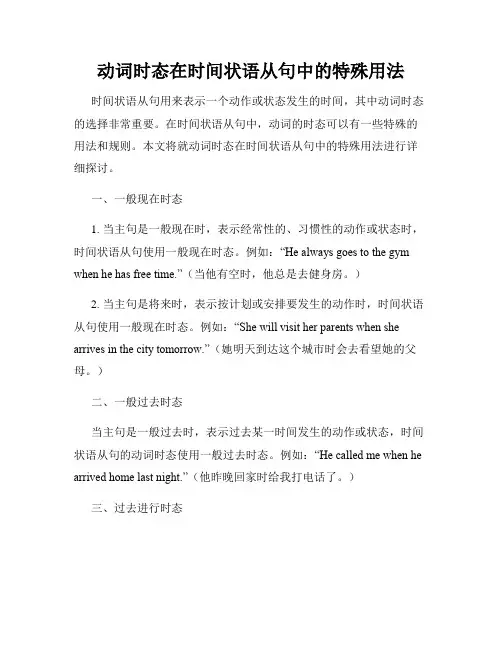
动词时态在时间状语从句中的特殊用法时间状语从句用来表示一个动作或状态发生的时间,其中动词时态的选择非常重要。
在时间状语从句中,动词的时态可以有一些特殊的用法和规则。
本文将就动词时态在时间状语从句中的特殊用法进行详细探讨。
一、一般现在时态1. 当主句是一般现在时,表示经常性的、习惯性的动作或状态时,时间状语从句使用一般现在时态。
例如:“He always goes to the gym when he has free time.”(当他有空时,他总是去健身房。
)2. 当主句是将来时,表示按计划或安排要发生的动作时,时间状语从句使用一般现在时态。
例如:“She will visit her parents when she arrives in the city tomorrow.”(她明天到达这个城市时会去看望她的父母。
)二、一般过去时态当主句是一般过去时,表示过去某一时间发生的动作或状态,时间状语从句的动词时态使用一般过去时态。
例如:“He called me when he arrived home last night.”(他昨晚回家时给我打电话了。
)三、过去进行时态当主句是过去进行时,表示过去某一时间正在进行的动作,时间状语从句的动词时态使用过去进行时态。
例如:“I was studying when she called me yesterday.”(昨天她给我打电话时,我正在学习。
)四、现在完成时态当主句是现在完成时,表示过去某一时间发生并与现在有关的动作或状态,时间状语从句的动词时态使用现在完成时态。
例如:“She has already left when I arrived home.”(我回到家时,她已经离开了。
)五、将来完成时态当主句是将来完成时,表示将来某一时间之前已经完成的动作或状态,时间状语从句的动词时态使用将来完成时态。
例如:“I will have graduated when you come back next year.”(明年你回来时,我已经毕业了。
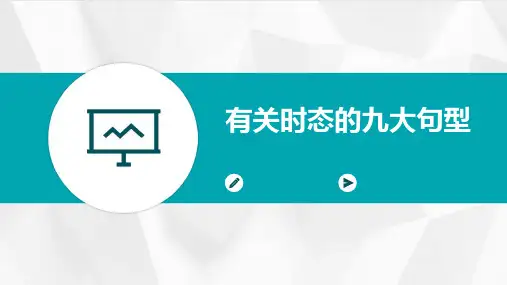

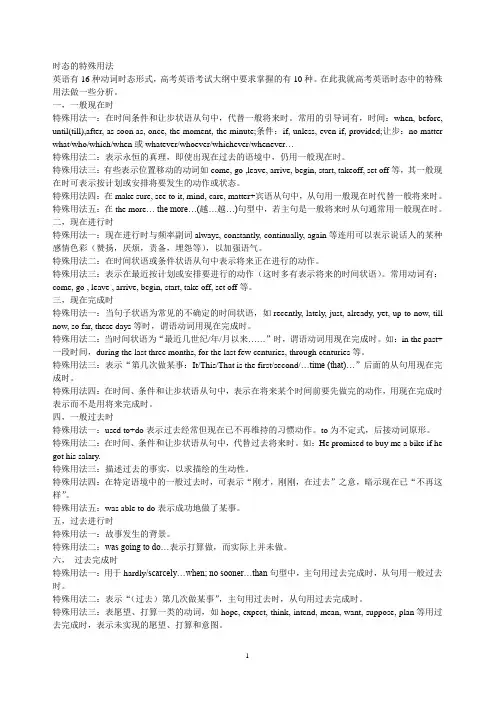
时态的特殊用法英语有16种动词时态形式,高考英语考试大纲中要求掌握的有10种。
在此我就高考英语时态中的特殊用法做一些分析。
一,一般现在时特殊用法一:在时间条件和让步状语从句中,代替一般将来时。
常用的引导词有,时间:when, before, until(till),after, as soon as, once, the moment, the minute;条件:if, unless, even if, provided;让步:no matter what/who/which/when或whatever/whoever/whichever/whenever…特殊用法二:表示永恒的真理,即使出现在过去的语境中,仍用一般现在时。
特殊用法三:有些表示位置移动的动词如come, go ,leave, arrive, begin, start, takeoff, set off等,其一般现在时可表示按计划或安排将要发生的动作或状态。
特殊用法四:在make sure, see to it, mind, care, matter+宾语从句中,从句用一般现在时代替一般将来时。
特殊用法五:在the more… the more…(越…越…)句型中,若主句是一般将来时从句通常用一般现在时。
二,现在进行时特殊用法一:现在进行时与频率副词always, constantly, continually, again等连用可以表示说话人的某种感情色彩(赞扬,厌烦,责备,埋怨等),以加强语气。
特殊用法二:在时间状语或条件状语从句中表示将来正在进行的动作。
特殊用法三:表示在最近按计划或安排要进行的动作(这时多有表示将来的时间状语)。
常用动词有:come, go , leave , arrive, begin, start, take off, set off等。
三,现在完成时特殊用法一:当句子状语为常见的不确定的时间状语,如recently, lately, just, already, yet, up to now, till now, so far, these days等时,谓语动词用现在完成时。
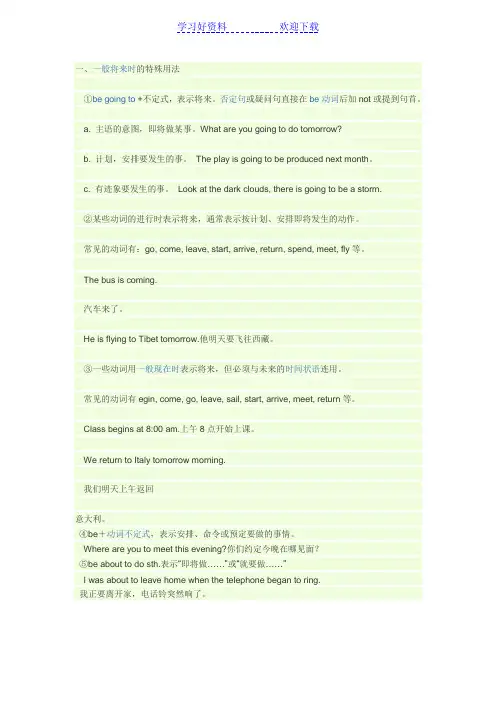
学习好资料欢迎下载一、一般将来时的特殊用法①be going to +不定式,表示将来。
否定句或疑问句直接在be动词后加not或提到句首。
a. 主语的意图,即将做某事。
What are you going to do tomorrow?b. 计划,安排要发生的事。
The play is going to be produced next month。
c. 有迹象要发生的事。
Look at the dark clouds, there is going to be a storm.②某些动词的进行时表示将来,通常表示按计划、安排即将发生的动作。
常见的动词有:go, come, leave, start, arrive, return, spend, meet, fly等。
The bus is coming.汽车来了。
He is flying to Tibet tomorrow.他明天要飞往西藏。
③一些动词用一般现在时表示将来,但必须与未来的时间状语连用。
常见的动词有egin, come, go, leave, sail, start, arrive, meet, return等。
Class begins at 8:00 am.上午8点开始上课。
We return to Italy tomorrow morning.我们明天上午返回意大利。
④be+动词不定式,表示安排、命令或预定要做的事情。
Where are you to meet this evening?你们约定今晚在哪见面?⑤be about to do sth.表示“即将做……”或“就要做……”I was about to leave home when the telephone began to ring.我正要离开家,电话铃突然响了。
现在进行时的特殊用法现在进行时表示现在或现阶段正在进行的动作,但也有一些特殊用法:1.现在进行时表示将来的意义。
go, come, leave, start, fly, travel, arrive等表示瞬间动作的现在进行时,可以表示按计划或安排即将发生的动作。
如:He is going to shanghai. 他将去上海。
The sports meeting is starting at 8:30 tomorrow morning. 运动会将于明天早上八点半开始。
2.现在进行时表示渐变的过程。
系动词get, become, grow, turn 等用现在进行时表示一个渐变的过程。
如:It’s getting warm. 天渐渐变暖和了。
The trees are turning green. 树木渐渐变绿了。
3.现在进行时表示感情色彩。
现在进行时常与always连用,表示经常性的动作,这种句子常带有赞扬或厌恶等感情色彩。
如:He is always helping others. 他总是帮助别人。
They are always talking in class. 他们总是在课堂上讲话。
不用于现在进行时态中的动词1.表示状态的动词be. 如:我的父亲在家。
正:My father is at home.误:My father is being at home.2.表示归属的动词,如have . 如:他有一台新电脑。
正:He has a new computer.误:He is having a new computer.3.表示喜欢、厌恶等情感的动词,如:like, love, hate等。
如:我非常喜欢红色。
正:I like red very much.误:I’m liking red very much.4.表示心理状态的动词,如:want,think(认为), know等。
如:我想去上海。
现在完成时的特殊用法1. 现在完成时的基本概念和用法现在完成时是英语中最常用的一种时态,它表示一个动作或状态一直持续到现在,并且还可能会继续下去。
在表达这种情况时,可以使用“have/has + 过去分词”的形式构成现在完成时。
例如: Ihave been studying English for 10 years (我已经学习英语十年了)。
现在完成时通常与表示时间段的状语连用,这样可以表达动作或状态发生的时间段以及其与现在的关系。
比如: I have beenworking here since 2010 (我从2010年开始在这里工作)。
2. 现在完成时的特殊用法一:强调结果现在完成时还有一个特殊的用法,就是强调一个动作产生的结果。
这时候,我们通常使用“have/has + 过去分词”+ 名词/形容词/副词等形式来表达。
例如:I have finished my homework (我已经完成了作业)。
这种用法通常与表示时间段的状语连用,以强调结果产生的时间段。
例如:She has been working hard, and her English has greatly improved (她一直在努力工作,英语水平已经有了很大的提高)。
3. 现在完成时的特殊用法二:经验现在完成时还有一个特殊的用法,就是表达一个人的经验。
这时候,我们通常使用“have/has + 过去分词”+ ever/never等形式来表达。
例如:We have never been to Paris (我们从未去过巴黎)。
这种用法通常表达对某个事情的经验或者对某种状态的感受。
例如:I have never felt so alive (我从未感觉如此活着)。
4. 现在完成时的特殊用法三:动作的反复或延续状态现在完成时还有一个特殊的用法,就是表示一个动作的反复或一个状态的延续。
这时候,我们通常使用“have/has + been + 过去分词”的形式来表达。
现在进行时有哪些特殊用法?现在进行时是英语中表示正在进行的动作或状态的一种时态。
除了表示基本的现在进行时外,还有一些特殊的用法和用途。
以下是现在进行时的几个特殊用法:1. 表示计划和安排现在进行时可以用来表示将来计划或安排要进行的动作。
这种用法常常与表示将来的时间状语连用,例如:- I am meeting a client tomorrow. (我明天要见一个客户。
)- They are going on vacation next month. (他们下个月要度假。
)2. 表示反复发生的动作现在进行时还可以用来表示反复发生的动作,表示惯或常规。
在这种情况下,通常使用always、constantly、continually等副词来修饰动词。
例如:- She is always interrupting people when they speak. (每次别人说话时她总是插嘴。
)- They are constantly arguing about politics. (他们经常在争论政治。
)3. 表示不满或抱怨现在进行时还可以表示对当前情况的不满或抱怨。
通常使用look或seem等动词配合现在进行时来表达这种含义。
例如:- It's raining again. It looks like we are not going to have a picnic today. (又下雨了。
看来今天我们没法野餐了。
)4. 表示临时状态或现象现在进行时还可以用来表示临时的状态或现象。
这种状态或现象可能是暂时的,过一段时间就会结束。
例如:- The sun is setting, and the sky is turning orange. (太阳正在落山,天空变成了橙色。
)- He is feeling tired after working all day. (他整天工作后感到疲倦。
)以上是现在进行时的几个特殊用法。
现在进行时的特殊用法1. 表示将来安排的动作现在进行时可以用来表示我们已经计划或安排好的将来要进行的动作。
例如:- I am meeting my friends after work.(我下班后要去见朋友。
)- They are leaving for vacation next week.(他们下周要出发去度假。
)2. 表示现阶段的固定事件或情况现在进行时还可以用来表示现阶段正在发生的、固定且持续的事件或情况。
例如:- She is studying law at the university.(她正在大学研究法律。
)- They are renovating their house.(他们正在翻新他们的房子。
)3. 表示不断变化的情况或动作现在进行时可以用来描述当前正在发生的变化或不断进行的动作。
例如:- The climate is getting warmer.(气候正在变暖。
)4. 表示临时操作或行为现在进行时还可以用来表示当前正在进行的临时操作或行为。
例如:- I am cooking dinner right now.(我正在做晚饭。
)- They are working on a new project this week.(他们这周正在做一个新项目。
)总结:现在进行时在英语中用来表示将来安排的动作、现阶段的固定事件或情况、不断变化的情况或动作以及临时操作或行为。
使用现在进行时时要注意句子的语境和时态的选择,以确保表达准确和清晰。
注意:1. 本文档只提供了现在进行时的特殊用法,没有进行复杂的法律解释。
2. 请确认文档内容的准确性和合法性,不引用无法确认的内容。
一般现在时的特殊用法㈠it can also be used to indicate the things to happen in the future. Thus it means the things must be done according to the plan, arrangement or stipulation and commonly they are not changeable.(一般现在时表将来)Eg: The train starts at 8:30. 火车将在8点半开The plane leaves for New York at eight this evening.We leave London at 10:00 next Tuesday and arrive in Paris at 13:00. We spend two hours in Paris and leave again at 15:00. We arrive in Rome at 19:30, and spend four hours in Rome.我们下周二10点离开伦敦13点到达巴黎。
在巴黎待两个小时,15点离开。
19点三十分到达罗马,在罗马待4个小时。
When does the film begin?I’m in my office from eight to twelve tomorrow morning.Tomorrow is Wednesday.Do you know what time the meeting is ?注:这种用法主要用于表示位置转移的动词,come go leave start return arrive sail 以及begin end stop open close 这样的少数动词。
㈡In adverbial clauses of time and condition and in some adverbial clauses of concession, the present indefinite tense is often used to indicate the future tense.(在时间、条件状语从句和一些让步状语从句中)He will be sad when he hear the bad news.I shall stay here no matter whether you do so or not.Even if you ask him again, he will not tell you.㈢表示过去的时间A 在口语中,表示传达信息的动词say tell hear read forget write learn 等,此时说话重点不在动作发生的时间,而在动作的影响持续到说话的时刻。
I forget what happened.I learn you are going to leave.I see you’ve got a letter from Ann. What does she say?—She says she is coming to London next week.B Quote the words of the historical figures, writers and books or newspapersMarx says,“A foreign language is a weapon in the struggle of life.”马克思说,外语是人生斗争的一种武器。
A notice at the end of the road warns people not to go any further.C 用于生动地叙述往事,使往事历历在目(也称历史现在时)(vividly relate the past and make the past clearly visible.)Eg:So she goes up to the policeman.“There’s a burglar in my house!”she says. “Are you sure of that?”asks the policeman. “Yes,”she says. So the policeman goes to her house and starts looking for the burglar. 于是她赶到警察那儿。
“我屋子里有贼!”她说。
“你肯定吗?”警察问。
“肯定。
”她说。
于是警察赶往她家,找起那个贼来。
㈣用于新闻标题或小说章节标题,电影、戏剧等的情节介绍,图片说明,舞台说明,实况解说,操作示范等。
(It is often used in news title or chapter title of novel, plot instruction of film and drama, caption, stage instruction, live commentary and demonstrative operation)Peace Talks Fail(news title)Earthquake rocks Wenchuan.汶川发生地震(news title)Observe that I add water to the solution, which then turns red.注意观察,我把水加进溶液,溶液就会变成红色。
(demonstrative operation)一般过去时的特殊用法①Want hope wonder think可用一般过去时表示说话人现在的感觉、想法,语气委婉。
Eg: Did you want me ? –Yes, I hoped you would give me a hand with painting. 你需要我吗?-- 是的,我希望你帮我油漆。
I wandered whether you would help me. 我不知道你是否愿意帮助我。
②在时间、条件状语从句中表示过去将来时间I knew that he would be sad when he heard the bad news.现在进行时1.时间条件状语从句中表将来进行Eg:If I am still sleeping when he comes,wake me up,please.2.进行时带有感情色彩, 大多用来表示厌烦、不满,也可用于赞扬。
常与always frequently all the time forever等连用Eg:It is always raining in England.He is always saying wrong things.他总是说错话.She is forever complaining about something.He is always thinking of others.3. 有些短暂性动词的现在进行时表示动作的反复或渐进性。
The big boy is hitting the little one. 这个大男孩不断地打那个小男孩。
The boy is jumping with joy.4. 表示思想状态的动词一般不用于进行时,用于进行时时表示思维的过程。
Consider forget think等Eg:I am forgetting my maths. 我的数学逐渐忘了。
I am forgetting my raincoat. 我差点忘了我的雨伞。
I am thinking where he is now.5. 表示喜\恶等情感的词一般不用于进行时.Love like dislike hate prefer object to 但是love like hate用来强调这种感情的暂时性时,可用于进行时。
Eg:I am loving the music.How are you liking your new job?Mind 意为照料是可用于进行时My husband is minding the baby,while I am out shopping.6. 表示要求\愿望的动词一般不用于进行时, hope want expect(预料要求)intend wish wonder wish require suggest但是hope 和intend 有时可以用于进行时表示语气委婉或强调持续一段时间。
I am hoping you can give me some advice.我一直希望你能给我点建议.We are intending to visit Rome.我们一直打算去罗马参观.expect 作为期待\盼望意思讲时课用于进行时.He is expecting a letter.7. 表示所属\拥有\构成\容纳等抽象关系的动词不用于进行时。
belong to have contain possess consist of interest own hold(拥有) depend on exist weight cost8. be +介词短语也常表进行时态,at on in underHe is at work.=He is working.The plane is in flight. The new machine is in wide use.The building is under construction.The number of the people asking to go there is on the increaseThe colour TV sets are on sale.He is on a visit to England.The present perfect tense现在完成时常跟long for+时间段since +时间点So far up till now in the past/last few yearsEg: I haven’t seen her in the past years.附:①表过去的经历,与表示不确定时间的ever never before already等连用。
Eg:He has ever lived in London. 他在伦敦住过.Have you ever been to Rome? 你到过罗马吗?We have never laughed so much before.Have you been in this school?②表示从过去到包括现在在内的这段时间中反复发生的动作和多次出现的状态。